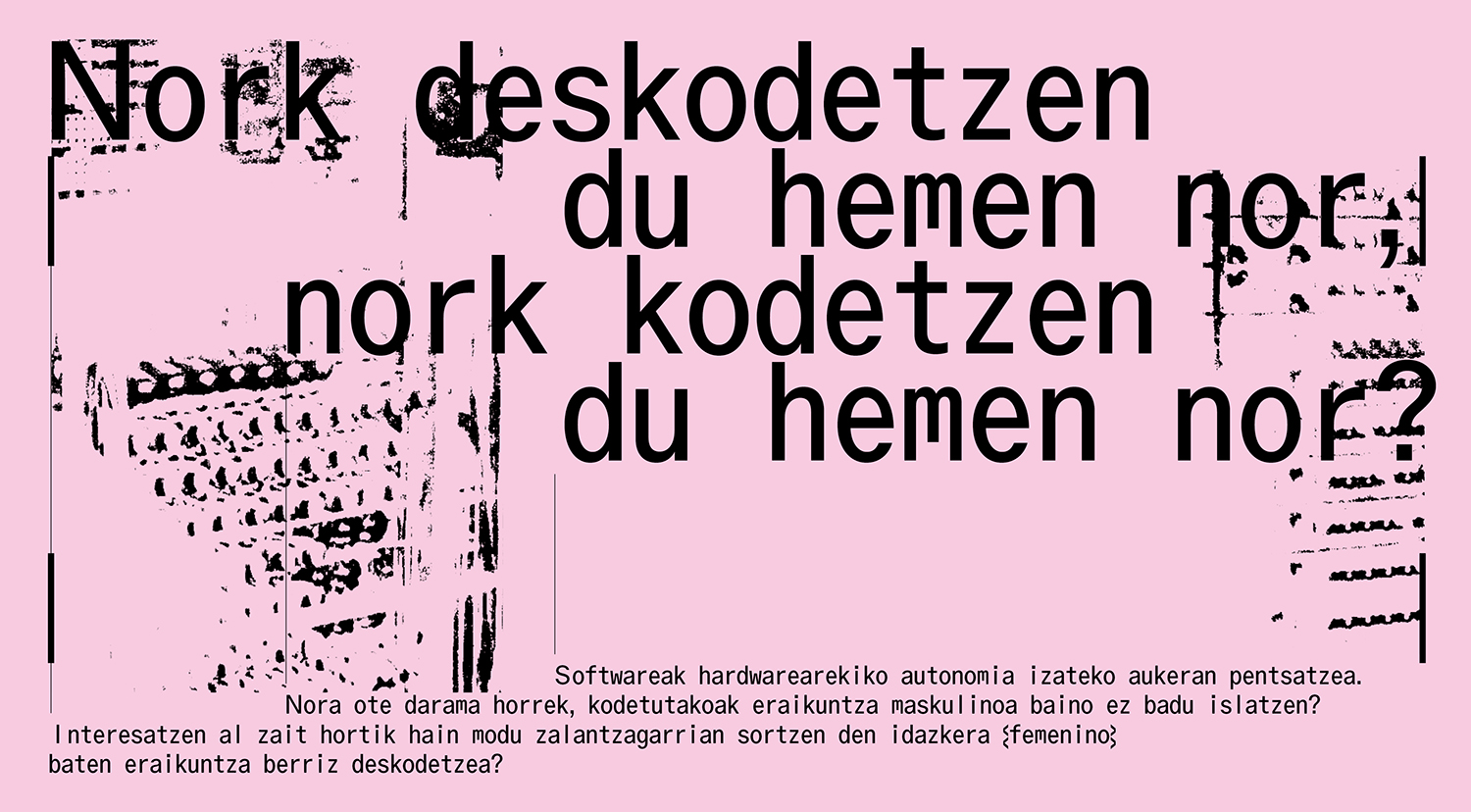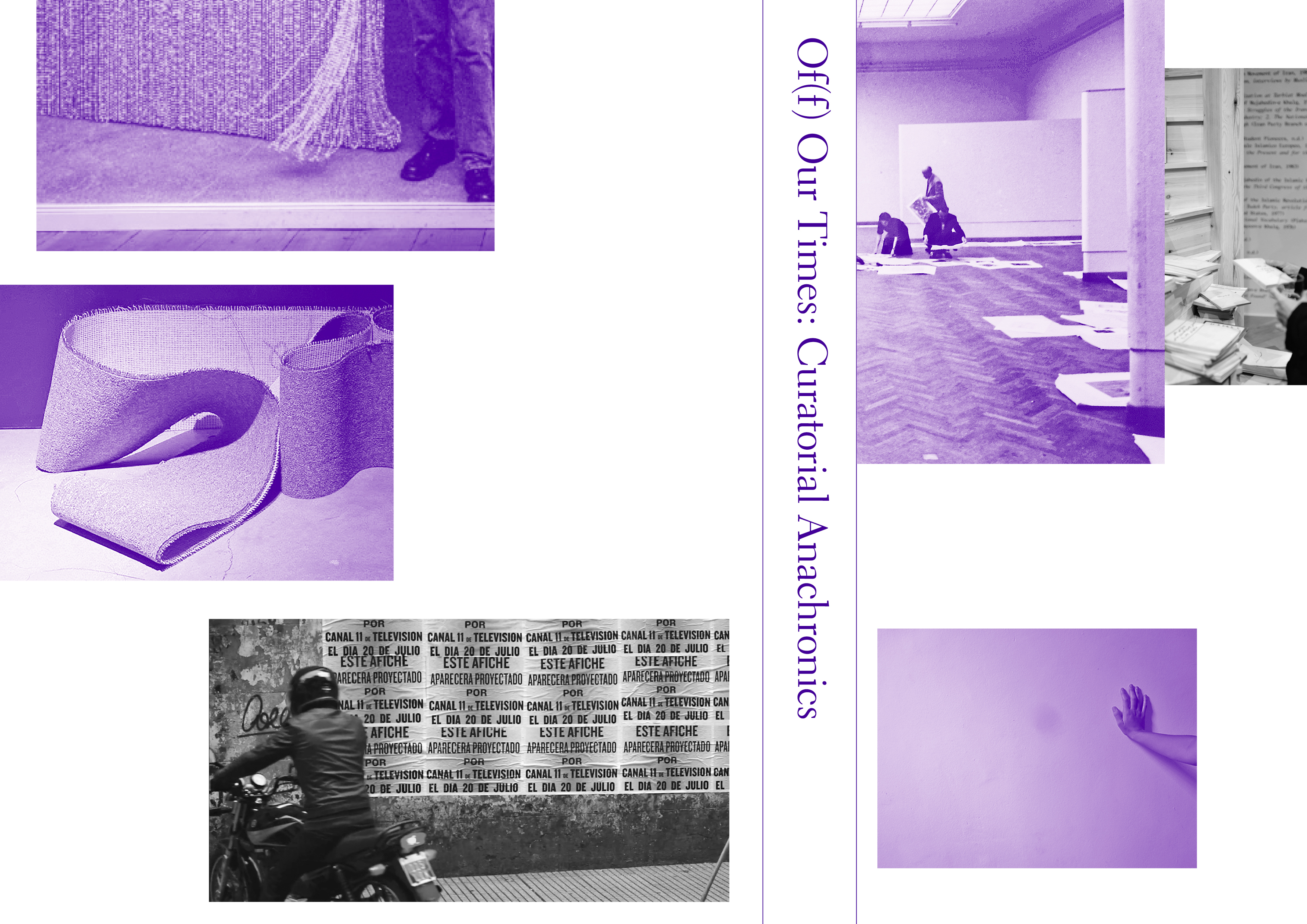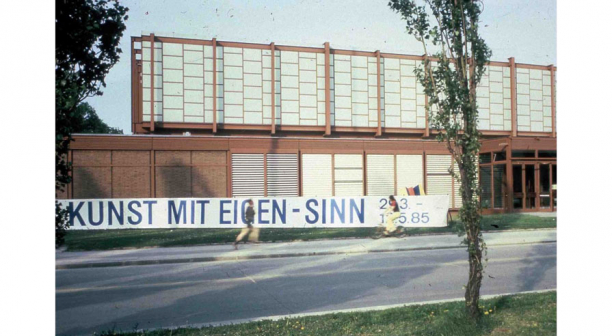Material Voices
MATERIAL VOICES 3: BEATRICE VON BISMARCK, RIKE FRANK, KATRIN MAYER
by
Nork deskodetzen du hemen nor, nork kodetzen du hemen nor? (Who is decoding whom, who is encoding whom?) is the title of the third session of Material Voices: Feminist genealogies of the work of making exhibitions. With Beatrice von Bismarck, Rike Frank and Katrin Mayer.
Material Voices: Feminist genealogies of the work of making exhibitions aims to investigate curatorial practices and women’s labour from the sixties until today. The programme uses dialogue as a tool for research. It explores the materiality of voices, exhibitions and artworks, and the intersections between them.
Opening hours for c0da by Katrin Mayer:
March 19 & 21 from 5:00 to 8:00 pm.
March 20 from 11:00 am to 1:00 pm.
NORK DESKODETZEN DU HEMEN NOR, NORK KODETZEN DU HEMEN NOR?*
We can very much relate to a notion of the exhibition as material voice. It brings to the fore the impact of exhibitions and their histories as transformative agents across different times and places beyond the singular event; and it draws attention to their crucial role in the concrete testing of new modes of narrating and relation building. Taking these thoughts further, curatorial practices have the capacity to give rise to new materialities. Beatrice von Bismarck and Rike Frank will pick up on this idea and speak about their joint inquiries into exhibition histories and curatorial research. In this context, the conversation will also address archival and research practices that acknowledge the dynamic and plural relations in curatorial processes and traverse sites of theory production, embodiment and modes of relating.
To allow the experience of a materiality of voices to sink in even deeper, artist Katrin Mayer will bring in her research project c0da, which deals with feminist methods of coding and writing. A web publishing site under development in close collaboration with programmer Anna Cairns, c0da combines the history of the computer as HERSTORY with feminist modes of writing. Moreover, Katrin has also invited a group of artists, writers and art historians to contribute. Some of them engaged in a series of correspondences loosely referring to figures like zeros, circles, holes and ooos, not least in reference to the zeros and ones in computing and their impact on feminist theory and philosophy, but also because of their respective plasticity.
Listening to these voices and in light of the event’s title – who decodes or encodes whom – writing, listening and recording runs through the material act of building narratives and constellations, of materiality shaping materiality, of relating to relations. This in turn leads us to one or two questions: in what ways can curatorial research participate in generating and shaping relations other than those already existing within the curatorial field? And how can it contribute to the materiality of disarticulated relations?
* Excerpt from Sophia Eisenhut, software warfare – EX PONTO BITCHES, 2021, translated from German into Basque by Itziar Santín, as part of Katrin Mayer’s publishing project c0da, designed by Anna Cairns.
BIOGRAPHIES
Beatrice von Bismarck teaches art history, visual culture and cultures of the curatorial at the Academy of Fine Arts Leipzig. She worked as a curator of the department of 20th-century art at Städel Museum, Frankfurt, was co-founder and co-director of the Kunstraum der Universität Lüneburg, initiator of the M.A. Program Cultures of the Curatorial and co-directed the itinerant TRANScuratorial Academy (Berlin, Mumbai, Phnom Penh 2017-2018). Her publications include Cultures of the Curatorial (ed. with Jörn Schafaff and Thomas Weski, Sternberg, 2012); Timing: On the Temporal Dimension of Exhibiting (ed. with Rike Frank, Benjamin Meyer-Krahmer, Jörn Schafaff, and Thomas Weski, Sternberg, 2014), and O(f)f Our Times: Curatorial Anachronics, (ed. with Rike Frank, Sternberg, 2019). Most recently, she edited the volume Archives on Show. Revoicing, Shapeshifting, Displacing: A Curatorial Glossary (Archive Books, 2022). Her new monograph, The Curatorial Condition (Sternberg), is forthcoming.
Rike Frank works as a curator and writer and teaches exhibition histories and curatorial practice. Currently, she serves as executive director of the Berlin Artistic Research Grant Programme as well as co-director of the European Kunsthalle. Most recently she has led the curatorial course at the Vladivostok School of Contemporary Art (2020) and co-edited Of(f) Our Times. Curatorial Anachronics (Sternberg, 2019) with Beatrice von Bismarck. Previous institutional positions include curator, Secession (2001–2005), head of curatorial office, documenta 12, curator, Academy of Visual Arts Leipzig (2012–2014), and Associate Professor of Exhibition Studies, Academy of Fine Art, Oslo National Academy of the Arts (2014-2018). Furthermore, she has edited and co-edited Ane Hjort Guttu. Writings, Conversations, Scripts (Sternberg, 2018), Textiles: Open Letter (Sternberg, 2015), Textile Theorien der Moderne. Alois Riegl in der Kunstkritik (b_books, 2015), Timing: On the Temporal Dimension of Exhibiting (Sternberg, 2014), and Sketches of Universal History: Compiled from Several Authors by Sarah Pierce (Book Works, 2013).
For her site-specific work, Katrin Mayer often researches in archives and local history in order to reflect and question the historicity of a place in the present. She recently received a scholarship from the Berlin Artistic Research Grant Program to develop c0da, a digital tool that reflects on feminist methodologies of coding and writing, in collaboration with programmer Anna Cairns. Katrin Mayer has developed work for Kunsthalle Osnabrück (2021), Kunstsammlung NRW, K21, Düsseldorf (2020), Kunstverein Hamburg (2017), Kunsthalle Lingen (2016), European Kunsthalle @ chambre d´amis Wien (2015), Ludlow38 MINI/Goethe-Institut New York (2014), Kunsthalle Bielefeld (2014), among others. www.katrinmayer.net
Material Voices: Feminist genealogies of the work of making exhibitions is part of the collaborative project ‘Communities of Learning, Bridging the Gap of Isolation’, initiated by WHW and supported by the Culture of Solidarity Fund of the European Cultural Foundation.
Material Voices is also supported by the Foundation for Arts Initiatives (FFAI), New York.










